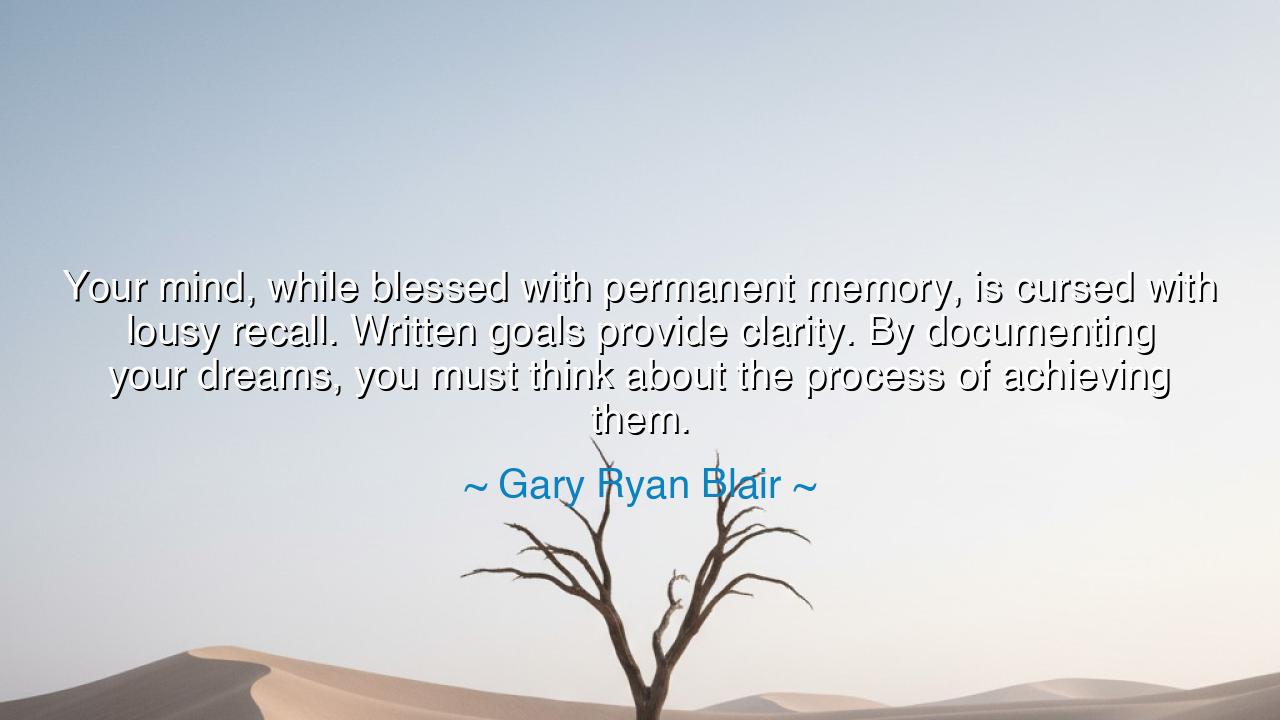
Your mind, while blessed with permanent memory, is cursed with
Your mind, while blessed with permanent memory, is cursed with lousy recall. Written goals provide clarity. By documenting your dreams, you must think about the process of achieving them.






Gary Ryan Blair's words, "Your mind, while blessed with permanent memory, is cursed with lousy recall. Written goals provide clarity. By documenting your dreams, you must think about the process of achieving them," offer profound insight into the nature of focus, intention, and the human mind's relationship with memory and action. While the mind may retain vast amounts of information, it often struggles to recall the details, especially when it comes to the goals we set for ourselves. Blair's solution is clear: writing goals is the key to unlocking not only clarity but the necessary focus to bring our dreams into fruition. Through the act of writing, we move from mere desire to deliberate action, and this is where true success is born.
The ancients knew well the power of clarity. In the writings of Plato, there is much discussion about the importance of intentionality in achieving a well-lived life. Plato’s belief that the philosopher must examine his own life through constant reflection mirrors Blair’s assertion that we must actively think about the process of achieving our goals. To Plato, the written word was a powerful tool for capturing thoughts, for organizing ideas, and for creating clarity. Much like Blair’s insight into the need for written goals, the ancients understood that clarity is not merely the absence of confusion but the focused effort to direct our energies toward what truly matters.
Aristotle, too, would understand Blair’s philosophy, as he placed great emphasis on the power of habit and deliberate action in achieving one's purpose. Aristotle famously stated, "We are what we repeatedly do. Excellence, then, is not an act, but a habit." This aligns perfectly with the idea that simply having dreams is not enough—one must break them down into actionable steps. By documenting our dreams, we force our minds to focus not just on the end goal but on the specific process required to achieve it. This is not a passive pursuit but an active commitment to cultivating the habits that will carry us toward our ambitions.
Take, for example, the life of Leonardo da Vinci, who kept countless notebooks throughout his life, documenting not only his art but his ideas, inventions, and studies. Da Vinci’s notebooks are filled with sketches, observations, and goals, each one a testament to his commitment to clarity. Though his genius was undeniable, it was his ability to write down his thoughts and ideas that allowed him to create works of lasting significance. His goals were not mere fleeting thoughts; they were documented, analyzed, and broken down into a process. It was through this very process that da Vinci became one of the greatest minds in history. Blair’s idea is embodied here—by writing down our dreams, we can better focus our efforts and bring those dreams into clearer and more actionable form.
Blair’s concept also reminds us of the importance of commitment. The act of writing down a goal is a form of public declaration to oneself. By committing thoughts to paper, we take the intangible and give it form, ensuring that our intentions are no longer fleeting but concrete. This is not just about remembering what we want, but about turning our dreams into a tangible plan. When we document our goals, we are forced to confront the process—the steps that must be taken, the obstacles that may arise, and the resources we must gather. In this way, writing serves as both a map and a reminder, helping us stay on track even when our initial inspiration begins to fade.
The lesson that Blair offers is one of discipline and clarity. In a world where distractions are many and time is short, we often allow our dreams to remain abstract and unfulfilled. The act of writing down our goals serves as a reminder to focus not only on the destination but on the journey. It forces us to think critically about what we want to achieve and how we will get there. Written goals do not simply record wishes; they chart the course toward accomplishment. The process itself requires intentionality, bringing our goals into the realm of reality and turning abstract desire into something that can be acted upon.
Thus, the practical action we must take is to start documenting our goals. Whether on paper, on a screen, or in a journal, writing down our dreams forces us to move beyond wishful thinking and into purposeful action. This practice creates a sense of commitment to our dreams and reminds us daily of the steps needed to achieve them. With clarity and focus come success—but only when we make a deliberate effort to chart the course. As Blair suggests, it’s not enough to have dreams; we must actively engage with them by writing them down and creating the blueprint for their fulfillment. Only then can we navigate the path that leads us from vision to reality.






AAdministratorAdministrator
Welcome, honored guests. Please leave a comment, we will respond soon